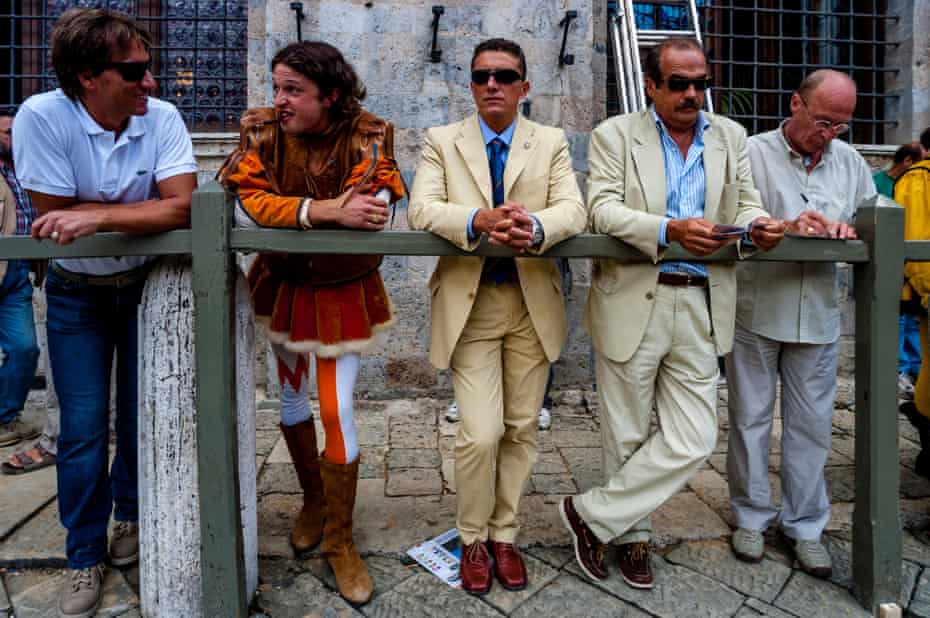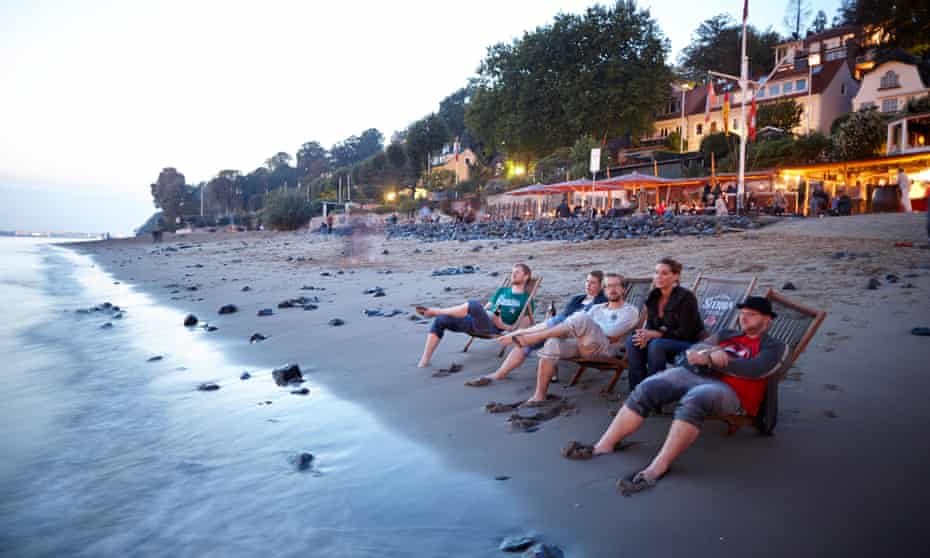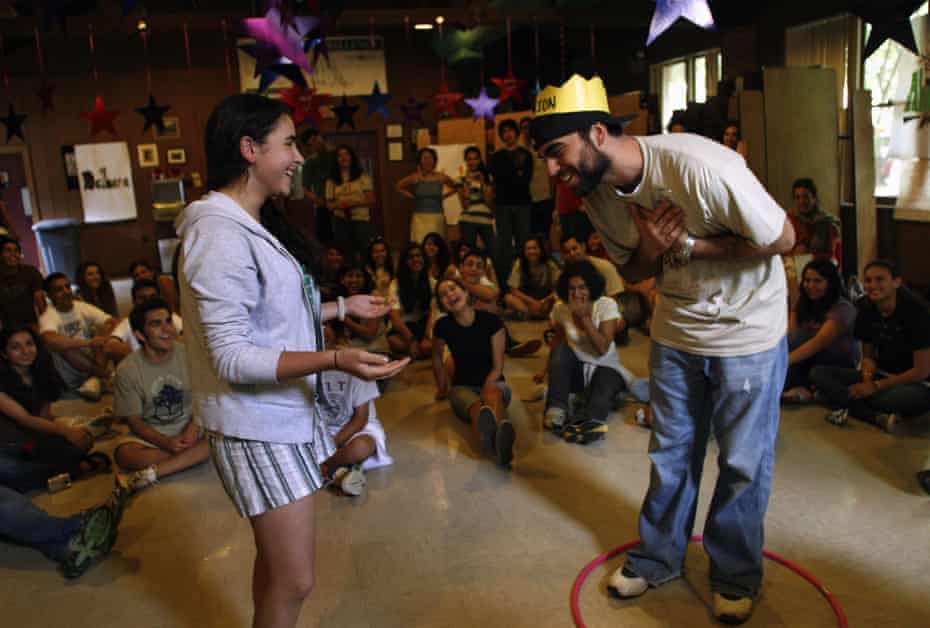Your Words Dont Translate
O ne of the many great things about languages worldwide is the sizeable number of words for which there is no real English language translation. Often they tell usa about concepts and ideas that we are missing out on in the anglophone world.
As the northern hemisphere heads abroad in the coming vacation season, here are a few to exist looking out for:

Kingdom of spain: sobremesa
You may have witnessed the ritual, knowingly or not, while on the hunt for a coffee or a cold beer towards the end of another long Spanish afternoon.
Sitting clumped around tables inside restaurants or spilling out on to their terrazas, are friends, families and colleagues, preserved in the post-prandial moment similar replete insects in amber.
Lunch – and it is more unremarkably lunch than dinner – will long since accept yielded to the important act of the sobremesa, that languid time when food gives way to hours of talking, drinking and joking. Java and digestivos will have been taken, or perhaps the large gin and tonic that follows a meal rather than precedes information technology hither.
The sobremesa is a digestive period that allows for the slow settling of food, gossip, ideas and conversations. It is also a sybaritic fourth dimension; a recognition that at that place is more than to life than working long hours and that few pleasures are greater than sharing a table and then chatting nonsense for a hefty portion of what remains of the day.
The world may non take been put completely to rights by the end of the sobremesa, just it volition seem a calmer, more benign identify.
Ask Mariano Rajoy. At the end of May, as it became articulate that he was going to be turfed out of part in a no-confidence vote, the so-prime minister did something very Castilian: he and his close circle retreated to a private room in a smart Madrid eating place. Lunch was followed by a seven-hr sobremesa, and, reportedly, a couple of bottles of whisky.
Later all, what does the loss of a premiership matter after a fine meal, a good cigar and some booze-soaked reminiscing? ¡Salud! Sam Jones in Madrid

PORTUGAL: esperto/esperta
Information technology feels almost counterintuitive to accept to explain what esperto/esperta means, a Portuguese give-and-take without true parallel in the English dictionary.
There are words that come up shut, that encapsulate something of the spirit of this give-and-take – and the word itself is spirited. On the ball, quick-witted, with-it, canny, having common sense, intuitive, someone who gets things done: these all help shade in the space occupied by esperto.
I grew up in Portugal and have always felt an undercurrent of admiration, most affection, for the espertas.
A Brazilian friend, Tatiana, though, warns of a negative sense. Someone esperto can, she says, use his or her instincts to take advantage of others; to trap or fool them into trouble.
Sometimes information technology's easier to understand something by what it is not. Esperta is definitely non irksome, dim, unimaginative. If these characteristics were on a spectrum, esperto would exist at one end, with "plodding" at the other.
If you understand it, you lot probably are. Juliette Jowit

ITALY: bella figura
Before celebrating a confirmation in Sicily last year, my aunt breathed a sigh of relief when she saw that her British niece was dressed accordingly plenty then as not to brand a bad impression in forepart of the extended family.
I was too relieved, as it meant I had non inflicted the expletive of the brutta figura, which literally translates as bad figure, on my family.
In pretty much all areas of life, whether information technology be in the way people dress, how they behave, how well their homes are kept or how impeccably a cake is presented and a gift wrapped, Italians strive to achieve the bella figura, or cute figure.
Such importance is placed on keeping upwards appearances and the finer item that for unwitting foreigners there'due south a sense of being sized up in everything you do, fifty-fifty going as far as to what y'all swallow and drink and at what time of the day you lot indulge in such activities.
"What matters is not what yous do simply how you appear," said an Italian friend, likening it to posting the perfect photograph on social media. It'southward a tactic that enables people to become promoted at work and politicians to win over admirers while giving the impression that they are achieving something.
"I call information technology 'selfie and spot'," the friend said. "For example, the politician takes a selfie confronting a beautiful backdrop, posts it on Facebook with a promise to exercise something, merely and then doesn't follow information technology through. With a good selfie and a good spot, you tin survive an entire career without doing anything." Angela Giuffrida in Rome

GERMANY: Feierabend
One of the almost misleading, but besides most enduring, myths almost German culture is that it values difficult work over a skillful siesta. Northern Europeans, the legend goes, have a "Protestant piece of work ethic" that means they get the job done even if information technology means staying in the office late into the night, while the southern Europeans wave it off with a mañana, mañana.
Anyone who sincerely believes that to be the case has never tried to phone call a German language office at one infinitesimal past five. When German workers say Ich mach' Feierabend ("I am calling it a day"), it rarely carries an apologetic undertone only usually comes with the confidence of someone claiming an aboriginal right.
Dating back to the xvithursday century, the term Feierabend, or "celebration evening", used to denote the evening earlier a public holiday, just has come up to refer to the free time between leaving the function and bedtime on any working day.
The key to agreement Feierabend is that information technology isn't time for going to the cinema or gym, simply time for doing nothing. In 1880, the cultural historian Wilhelm Heinrich Riehl described the concept every bit "an atmosphere of carefree wellbeing, of deep inner reconciliation, of the pure and articulate repose of the evening".
Frg'southward adherence to the Feierabend rulebook can frustrate when you lot are trying to brand a work call on a Friday afternoon or buy an aspirin from a pharmacy on a Dominicus (Sundays being a 24-60 minutes celebration evening).
But as a philosophy, information technology underpins the proudest achievements of the German language labour move and may just explain why the land has some of the highest productivity levels in Europe: to truly cherish the evening, you lot make sure you go the job done before 5 o'clock. Philip Oltermann in Berlin

FINLAND: sisu
Sisu is an untranslatable Finnish term that blends resilience, tenacity, persistence, determination, perseverance and sustained, rather than momentary, courage: the psychological strength to ensure that regardless of the cost or the consequences, what has to exist done will be done.
It originates from the give-and-take sisus, meaning "intestines" or "guts"; Daniel Juslenius, author of the first Finnish-language dictionary in 1745, defined sisucunda every bit the place in the torso where strong emotions live. In a harsh environment and with powerful neighbours, information technology was what a young nation needed.
Sisu is what, in 1939-40, allowed an army of 350,000 Finns to twice fight off Soviet forces 3 times their number, inflicting losses five times heavier than those they sustained.
More than prosaically, information technology has helped Finns become through a lot of long, lonely, dark and freezing winters, building in the procedure one of the wealthiest, safest, most stable and best-governed countries in the world. It is not all skilful, of course. Sisu can lead to stubbornness, a refusal to accept advice, an inability to admit weakness, a lack of compassion.
It has get a chip of cliché in Finland – a brand proper noun for trucks and strongly-flavoured sweets. Research shows it holds picayune entreatment to the immature. Just ask a Finn to define the national graphic symbol, and information technology's the word almost still reach for. Jon Henley

IRAN: Ta'arof
Ta'arof is a Persian word that has no English equivalent, referring to the fine art of etiquette ubiquitous in everyday Iranian life.
"Yous go outset," says Mr A equally he meets Mr B at the doorstep, as they try to enter a building. "No, it's non possible, yous become showtime," Mr B insists in response. Ta'arof dictates a ritual that may see them both waiting for a couple of unnecessary minutes before one steps forwards to enter.
It is an etiquette that is seen virtually in all aspects of Iranian life, from hosts insisting on guests taking more than food from the table, to the exchanges in the bazaar. "How much is this carpet?" asks Ms A afterward choosing her favourite in the shop. "It's worthless, yous can just have information technology," responds the seller, quite disingenuously.
Although Ms A in reality cannot have the carpet out of the shop without paying for information technology, the seller might insist upwardly to 3 times that she should only practice that, until the amount of the price is finally mentioned.
The awkward exchanges may have originated out of politeness; ultimately, they may piece of work to the seller's favour, as the buyer feels a certain obligation to respond to such deference with a purchase, even if the final price is more than than she expected.
Some other case: you are walking with a friend and yous end up doing Ta'arof, request him to come to yours for lunch, even though yous don't have anything prepared and y'all don't really want him to take.
The friend insists out of Ta'arof that he wouldn't come because he knows you're tired and doesn't want to exist a burden, even though deep downwards he really wants to accept lunch at your place.
"Oh, don't Ta'arof," yous say in a Ta'arof asking your friend not to Ta'arof. He ends up accepting your reluctant Ta'arof. You lot're a bit irked, but you'll have to be all smiles. Non all Taa'rofs are insincere; some are, some aren't. You lot'd Ta'arof even if you badly want something, saying yous don't desire it; you'd Ta'arof if you really hate something, pretending you desire information technology. Saeed Kamali Dehghan

Russian federation: тоска (toska)
Leave information technology to Russian federation to serve upwards the melancholy: toska translates equally yearning or ennui. Except it doesn't, because no English word tin can accurately reflect all the shades of the word, to paraphrase Vladimir Nabokov.
What tin toska (pronounced tahs-kah) hateful? Spiritual anguish, a deep pining, perhaps the product of nostalgia or beloved-sickness, toska is depression plus longing, an unbearable feeling that you need to escape but lack the hope or free energy to do so.
Visually to me, toska conjures up an countless field of birch on the edge of St Petersburg, in the dead of winter when the clouds never function, and information technology's simply calorie-free for 5 hours a day anyway.
Toska is the stuff of great literature. Evgeny Onegin, the foundational Russian novel-in-verse about superfluous men, unrequited love and duels? Loads of toska.
Anton Chekhov wrote an entire short story chosen Toska about a cabman who recently lost his son and searches for someone to talk to well-nigh his grief. He ends up talking to his horse. All that broodiness in the great (and not-so-great) Russian novels? You become the motion picture.
And so why choose toska for this listing of positivity? Because if the Russian soul s the place where great emotions reside, and then toska pays the hire. Without toska there cannot be delirious happiness, endless heartfelt conversations at 4am at the kitchen table, boundless generosity at obvious personal expense.
Toska is a sign that your emotions go across logic and that yous are really, truly living your emotions. Perhaps yous've felt toska and you didn't realise it, but it's a adept affair: it means you've got a little bit of the Russian soul in you. Andrew Roth in Moscow

JAPAN: shoganai
Equally inhabitants of an archipelago that is regularly struck by earthquakes and tsunamis, and – as recent events have tragically demonstrated – floods and landslides, information technology is little wonder that the Japanese have a well-developed sense of fatalism. Whatever verbal reflection on humans' powerlessness to control nature's virtually destructive forces oft elicit the phrase shoganai.
The expression, meaning, "information technology can't be helped," is Japan's catchall response to whatever situation, big or minor, over which people believe they accept no influence. A more voguish translation might be "it is what it is". A French person would immediately recognise it every bit a version of "c'est la vie".
It could exist heard, delivered with deep reflection, amid the rubble of the March 2011 earthquake and tsunami and, in resigned tones, after Nihon's agonising exit from the Earth Cup in Russia.
Shoganai, and its synonym shikata ga nai, are exact coping mechanisms that utilize equally to unwelcome developments in everyday life, from getting struck in a traffic jam to having to spend Friday evening at the function.
With its roots in the Zen Buddhist belief that suffering is a natural part of life, it could perhaps exist described as Japan's version of the tranquility prayer – a personal and communal recognition that, on occasion, passive acceptance of an unfortunate truth is far easier than trying to deny information technology.
Only resigning oneself to ane'south fate with a muttered "shoganai" has its drawbacks. Some observers of Japanese culture note that it is likewise often practical in situations in which humans have more influence than they think.
For much of the seven decades since the terminate of the second world war, in that location has been a general credence of the authorisation of the conservative Liberal Democratic party, even among liberal voters. Some have pointed to its role in allowing the rise of Japanese militarism in the beginning half of the 20th century.
Shikata ga nai is, then, partly to blame for weaknesses at the eye of Japan's democracy, allowing one party to dominate even, every bit is the example today, when information technology is mired in scandal.
In a country with few energy resources of its own, nuclear power was for decades the beneficiary of the shoganai mindset, one that accepted the structure of dozens of nuclear reactors along the coastline as a necessary evil.
It took Fukushima to prove that Japan'south lauded sense of fatalism can sometimes be downright dangerous. Justin McCurry in Tokyo

NETHERLANDS: polderen
Het poldermodel and its associated verb, polderen, derive from the Dutch habit of working together to repossess parts of their state from the body of water. Since the Centre Ages, everyone on the same polder, regardless of religion, politics, class and local rivalries, has had to cooperate in maintaining the circuitous but vital organisation of windmills and dykes that kept their state dry.
The term, which has been defined as "pragmatic cooperation despite differences", has been used since the mid-1970s to depict the kind of consensus political controlling common in holland, which has been governed past coalitions for over a century, since no unmarried party has always held a majority.
In policymaking, the concept is exemplified by a Dutch establishment known equally the Social-Economic Council, a tripartite forum in which authorities, employers' federations and unions air their differences, generally reaching consensus on bug such as wage restraint, working hours, job creation and productivity.
In politics, Dutch governments – the latest, a coalition betwixt 4 parties with widely different views, took a record 208 days to hammer out – are the embodiment of the poldermodel, which has come in for increasing criticism, peculiarly from the radical correct, since the financial crisis of 2008.
Politicians such as Thierry Baudet of the nativist, right-wing Forum for Democracy contend the poldermodel has led to a "political cartel" in which endless compromise has robbed the major parties of all distinguishing features and left them incapable of taking essential decisions. Jon Henley

Mainland china: tiáo 条
How do we categorise or allocate things, thereby imagining them as ane affair and non another? Different French or German language, gender does not provide categories in Chinese, which groups things by something else entirely: shape.
Tiáo is one of at least 140 classifiers and measure words in the Chinese language. It's a measure out word for long-narrow-shape things. For instance, bed sheets, fish, ships, bars of soap, cartons of cigarettes, avenues, trousers, dragons, rivers.
These measure words embrace the ways in which shape imprints itself upon usa, while playfully noticing the relationships between all things. The measure word kē 颗 (kernel) is used for modest, roundish things, or objects that appear modest: pearls, teeth, bullets and seeds, as well as distant stars and satellites.
Gēn 根, for thin-slender objects, will appear earlier needles, bananas, fried craven legs, lollipops, chopsticks, guitar strings and matches, among a thousand other things. "Flower-like" objects gather under the word duo 朵: bunches of flowers, clouds, mushrooms and ears.
It's endlessly fascinating to me how we attempt to grouping anything or anyone together, and how formations change. Philosopher Wang Lianqing charts how tiáo was first applied to objects we can pick up by hand (belts, branches, string) and then expanded outward (streets, rivers, mountain ranges).
And finally tiáo extended metaphorically. News and events are as well classified with tiáo, perhaps because news was written in long vertical lines, and events, as the 7th-century scholar Yan Shigu wrote, arrive in lists "one past one, as (arranging) long-shaped twigs".
Onwards the idea broadened, so that an idea or stance is likewise "long-shaped news," and in the 14th century, tiáo was used for spirit, which was imagined every bit straight, high and lofty. In language, another geometry is at work, gathering recurrences through time and infinite. Madeleine Thien
What is your favourite word, concept or idea in the country you live in? Allow usa know in the comments, or at theupside@theguardian.com
Source: https://www.theguardian.com/world/2018/jul/27/10-of-the-best-words-in-the-world-that-dont-translate-into-english
0 Response to "Your Words Dont Translate"
Post a Comment